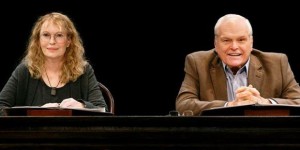In today’s Wall Street Journal I review two New York revivals, A.R. Gurney’s Love Letters and George Kelly’s The Fatal Weakness. Here’s an excerpt.
* * *
You know a playwright has really arrived when he has plays simultaneously running on and Off-Broadway. A.R. Gurney, Terrence McNally and Tom Stoppard are all being so honored this fall, and it’s Mr. Gurney who’s getting the fanciest treatment. While “The Wayside Motor Inn” is currently being performed by Signature Theatre, “Love Letters,” his perennially popular two-character epistolary play about a pair of aging childhood friends who should have been more, has just received its first Broadway revival since the original 1989 production, with Mia Farrow and Brian Dennehy leading a roster of nine stars who will rotate in and out of the show during its five-month run.
 One reason why “Love Letters” is so frequently produced is that it’s written in such a way as to facilitate both come-and-go celebrity casting and bargain-basement staging. Not only is there no set, but the actors sit together at a table and read from scripts instead of memorizing their lines. But the enduring success of “Love Letters” is far more than a mere matter of logistical convenience. It’s one of Mr. Gurney’s best plays, a tender study of thwarted love….
One reason why “Love Letters” is so frequently produced is that it’s written in such a way as to facilitate both come-and-go celebrity casting and bargain-basement staging. Not only is there no set, but the actors sit together at a table and read from scripts instead of memorizing their lines. But the enduring success of “Love Letters” is far more than a mere matter of logistical convenience. It’s one of Mr. Gurney’s best plays, a tender study of thwarted love….
While Mr. Dennehy may not have been born to play a WASP named Andrew Makepeace Ladd III, his bluff, heartfelt simplicity of manner leaves little to be desired. Unlike him, Ms. Farrow has done comparatively little stage acting, and so the quivering intensity of her fearlessly projected, fully involved performance (you’d never guess that she hasn’t appeared in a commercial Broadway play since 1980) is the most gratifying of surprises…
The Mint Theater, which has a near-perfect track record of exhuming forgotten plays of the previous century that deserve a happier fate, has gone back to the well with George Kelly, the once-famous author of “The Show-Off,” whose “Philip Goes Forth” the Mint produced to brilliant effect last season. This time around it’s “The Fatal Weakness,” an identically impressive play by Mr. Kelly that opened on Broadway in 1946, ran for three months and thereafter went unseen until now.
No doubt the ambiguity of “The Fatal Weakness” explains its initial lack of success. It’s a smart, polished not-quite-comedy about the high price of adultery whose upper-crust characters are unlikable and whose moral—if you care to call it that—is uncomfortable. Though no one mentions World War II, not even in passing, Mr. Kelly was surely out to show how it triggered a convulsion in American mores, which gives the laughter an astringent sting…
* * *
To read my review of Love Letters, go here.
To read my review of The Fatal Weakness, go here.
